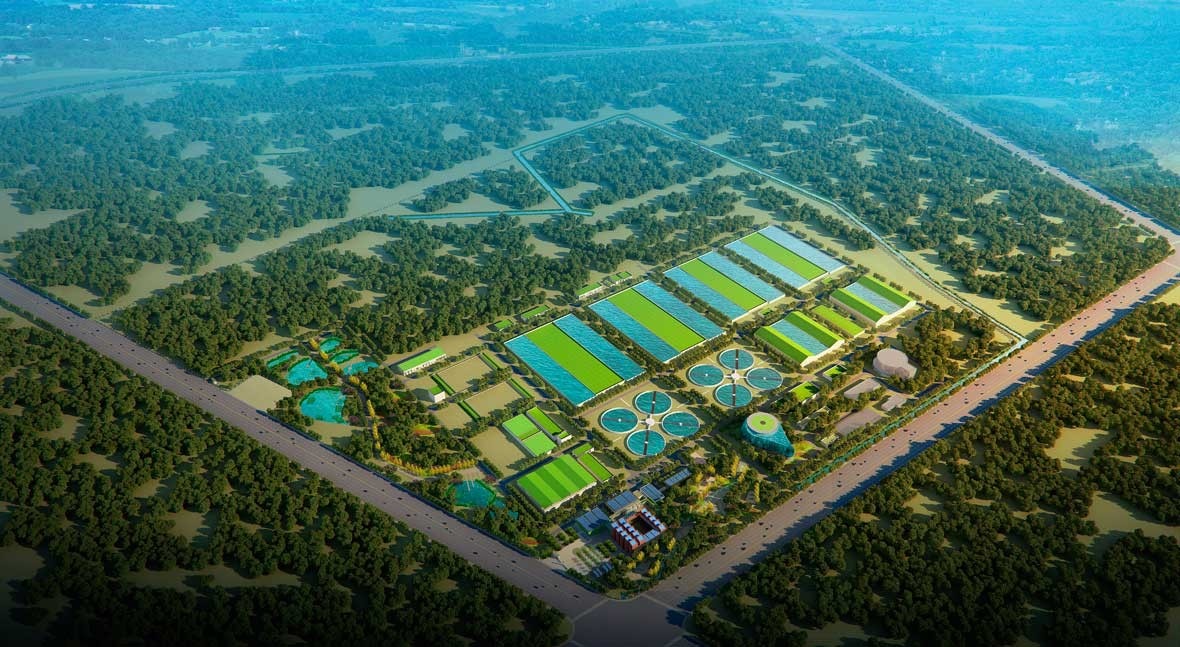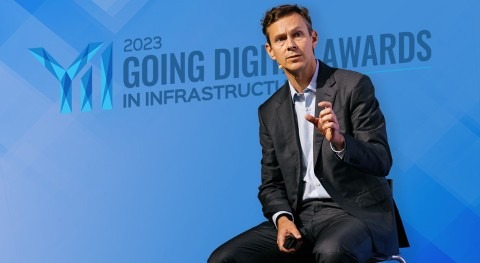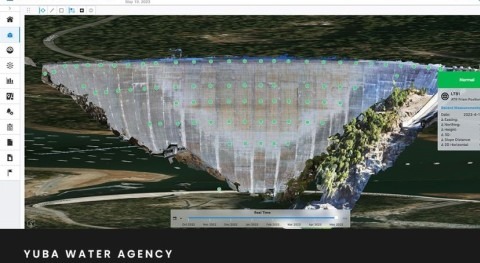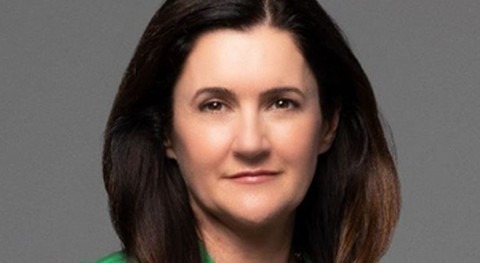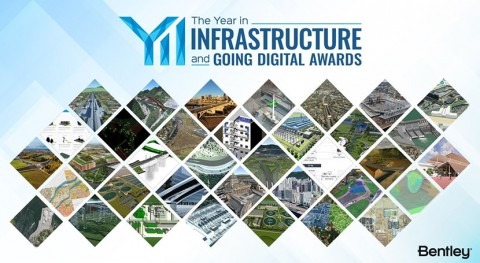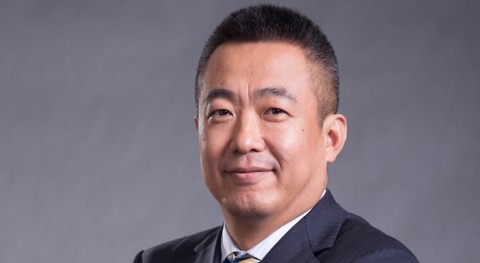Every year the city of Barcelona organizes one of the world’s leading events for cities, the Smart City Expo World Congress, where governments and corporate leaders come together to accelerate sustainable, inclusive cities and collectivize urban innovation.
Digital cities expert Bentley Systems in partnership with Microsoft participated in this last global event to showcase their technology solutions to help cities and stakeholders around the world establish themselves as a smart digital city.
We had the chance to speak with three smart city specialists from Bentley Systems: Jerry King, Vice President, Strategic Channel, Ton De Vries, Senior Director – Digital Cities Business Development and Frank Braunschweig, Water and Wastewater Senior Product Manager, to determine how digital twin technology can benefit the water industry and the latest trends in the transformation of cities through the use of modern technologies.
Question: What is meant by Smart City, and how does Bentley Systems contribute in the Digital Cities development?
Ton de Vries: Bentley Systems delivers digital twin solutions to help city stakeholders’ access trusted information whenever and wherever it is needed and use that information to gain insights about the project. We help cities create, visualize and analyze citywide digital twins for planning, performance, and resilience. A city digital twin is a digital representation of a physical asset, process or system, as well as the engineering information that allows us to understand and model its performance. A digital twin of a city captures what is aboveground and belowground and includes the city’s roads, rail, buildings, water and electric utilities, and so much more. It is a system of systems, or as some would say the interface to the planet.
Bentley’s city digital twin solution provides the infrastructure and tools that team members can use to create, maintain, and gain access to a digital twin. The solution is based on open standards and uses open data and an open source iModel.js library for unlimited and unrestricted access to the digital twin by third-party developers. The solution allows cities to involve local companies and others to participate in the going digital strategy that is necessary to become a smart city.

Ton De Vries, Senior Director Business Development Digital Cities at Bentley Systems
Q: Why has Bentley Systems participated in the Smart City Expo World Congress?
Ton De Vries: At Smart City Expo World Congress, Bentley Systems showed three main areas where a city digital twin helps cities become smarter:
Planning and project visualization: Cities want to improve urban planning with greater levels of detail and by optimizing the performance of existing assets. Cloud technology enables faster development, higher productivity, reduced costs, and more secure environments for cities. Bentley, working closely with its strategic partner Microsoft, delivers solutions on Azure, tapping the power of the cloud to realize the potential of real-time business insights and collaboration for greater efficiency.
Stakeholder and Citizen Engagement: Cities want to engage stakeholders and the public to improve communication and feedback from master planning to project realization. By improving engagement, cities can deliver on the promise of transparency.
Urban Infrastructure Resilience: Extreme hydrometeorological events with rapid urbanization and inadequate draining substructures trigger flooding, which damages infrastructure, impacts public safety, and weakens the economy. Flood resilience refers to how a city can comprehensively manage flood risks to minimize these impacts and rapidly recover from disruptions cause by the floods.
Bentley’s flood-resilience solution for urban, riverine, and coastal systems bring accurate and reliable risk and analysis data to agencies involved in flood preparedness, response, recovery, and mitigation. By using digital twins, cities can understand and mitigate flood risks through a complex array of interconnected processes related to urban, riverine, and coastal systems through integrated flood modeling and simulation.
By using digital twins, cities can understand and mitigate flood risks through a complex array of interconnected processes
Q: How are Bentley Systems and Microsoft working together to lead the Digital Cities initiative?
Jerry King: Bentley Systems and Microsoft are working together to bring many of Bentley’s digital twin solutions to the Azure cloud for scalability and to offer an immersive 3D environment for project communication and urban development. In Singapore, for example, Bentley has worked with Microsoft to create a digital twin of the new Microsoft APAC headquarters leveraging Bentley digital twin technology on Azure together with information gathered from the physical environment through IoT sensors and end-user experiences, which provides a single view into the wide variety of data that is available.
Q: What is Bentley Systems’ OpenFlows WaterOPS service?
Frank Braunschweig: Bentley Systems’ OpenFlows WaterOPS is a real-time operational and optioneering decision-support solution for urban water supply and distribution. Integrating live SCADA data with a calibrated hydraulic model, OpenFlows WaterOPS computes real-time conditions throughout water networks, based on existing conditions and forecasted future conditions. OpenFlows WaterOPS empowers water utilities to instantaneously gain better visibility into dark data between monitored locations, predict future performance, and react to events and emergencies.
Operators and operations engineers can confidently share and collaborate with stakeholders by evaluating various what-if actions when quick decisions are needed due to a fire, pipe break, pump outage, or other time-critical events. Moreover, the software can determine network impact and the ensuing effects these events will have on customers.
OpenFlows WaterOPS empowers water utilities to instantaneously gain better visibility into dark data between monitored locations, predict future performance, and react to events and emergencies
Q: Can you tell us a bit about the winner of this Year in Infrastructure 2019 special recognition for ‘Digital Cities Award for Comprehensive Water Digital Twins’?
Frank Braunschweig: This year, Águas do Porto (Oporto Water Utility - AdP) won the Year in Infrastructure 2019 special recognition award for Comprehensive Water Digital Twins. AdP is responsible for the sustainable and integrated management of the entire urban water cycle of the city of Oporto, Portugal, including water supply, wastewater drainage and treatment, stormwater drainage, surface waters, and coastal bathing water quality. It is one of the largest Portuguese companies in the sector with over 150,000 clients serving around 500,000 people, and it delivers an average of 45,490 cubic meters of water to the population daily and collects approximately the same amount for treatment.
The density and complexity of the hydraulic infrastructure and water resources in Oporto drive the need for the integrated management of the urban water cycle, while also raising challenges in the integration of the vast number of existing systems throughout the company. To integrate the data gathered simultaneously from a wide range of systems and sources, spread over dozens of individual software systems, AdP decided to develop the “Technology Platform for the Integrated Water Management of the Urban Water Cycle – H2Porto.” The goal of H2Porto is to promote a culture of innovation and smart water management for the efficient usage of existing resources. H2Porto integrates territorial information via geographic information systems, video surveillance of infrastructure, numerical modeling, remote data acquisition, and public reporting with the following firm objectives: (i) integrate all information from the different systems (water supply, wastewater, stormwater, natural channels, and coastal areas); (ii) uniformization of all data acquired through remote sensors; (iii) real-time display of all data in user-friendly dashboards; (iv) integrate online and offline numerical models for all systems; (v) modules for automatic alerts and warnings (based on data acquisition and numerical models); (vi) reporting and data mining; (vii) and publishing selected information for the general public.
With these functionalities described, the platform H2Porto is a comprehensive water digital twin.
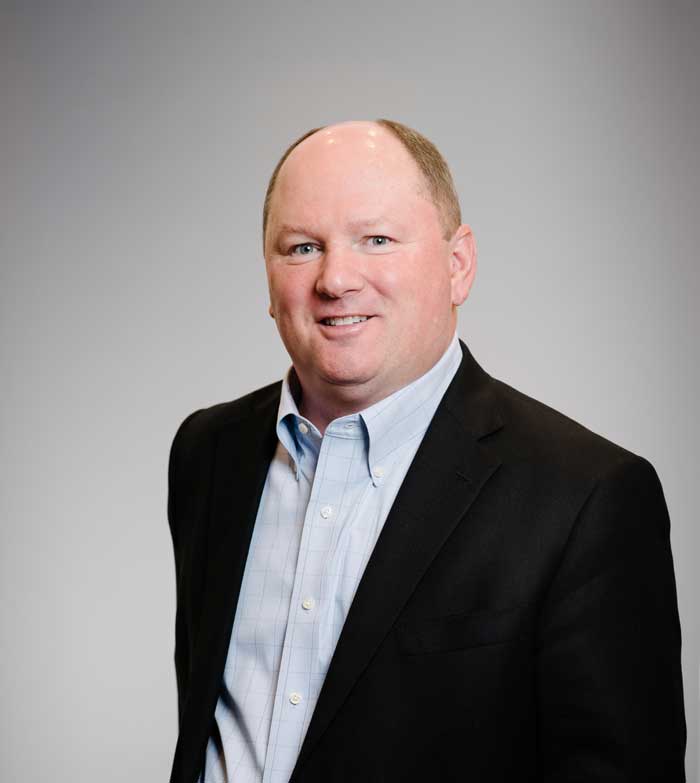
Jerry King, Vice President, Strategic Channel at Bentley Systems
Q: Bentley Systems recently launched AssetWise Digital Twin Services and OpenUtilities Digital Twin Services. Can you tell us a bit more about these products?
Jerry King: AssetWise Digital Twin Services converge digital context, digital components, and digital chronology to provide immersive visualization and advanced analytics for enhanced decision support and improved performance of infrastructure assets. To gain and act on insights that impact the performance and reliability of infrastructure assets, and also of the networks that connect them, digital twins must provide live and accurate physical and engineering data across time, effectively in 4D. Through the accessibility of cloud and web services, and our open-source platform for immersive visualization and analytics visibility, AssetWise Digital Twin Services will enable all AssetWise users, and new users, to broaden the benefits of going digital more comprehensively.
Under the AssetWise Digital Twin Services is iTwin Immersive Asset Service. It enables owner-operators using AssetWise to align asset performance data and operational analytics in the context of a rich interactive 4D digital twin model environment. The service helps make engineering information accessible to a wider audience of users through immersive and intuitive user experiences. iTwin Immersive Asset Service shows “hotspots” of activity and how the status of an asset changes over time. This more complete and rapid understanding leads to better and more timely decision-making, minimizes downtime, increases safety, and improves asset performance. Based on Bentley’s iModel.js, iTwin Immersive Asset Service makes it easy to combine engineering, reality, GIS, and Internet of Things data to create an immersive experience in 3D and 4D.
OpenUtilities Digital Twin Services use digital twins for consolidating, validating, and aligning GIS, reality modeling, performance, simulation, and other enterprise data required to effectively manage assets including power plants, substations, and entire networks. Energy utilities are faced with modernizing their aging infrastructure along with the new challenges of distributed energy resources at the grid edge. OpenUtilities Digital Twin Services enable organizations to identify data quality issues, visualize these issues on a map, and resolve issues using smart rules and machine learning. Pre-defined and user-extensible dashboards and analytics provide insights and visualization for OpenUtilities digital twins.
Q: How can digital twin technology help the water industry?
Ton De Vries: Water utilities want to achieve the holistic management of the water cycle in a smart-city context. A digital twin federates and aggregates data from many sources, providing a solution for predictive operational analytics to help predict performance, identify failures early, and prescribe actions based on asset information.
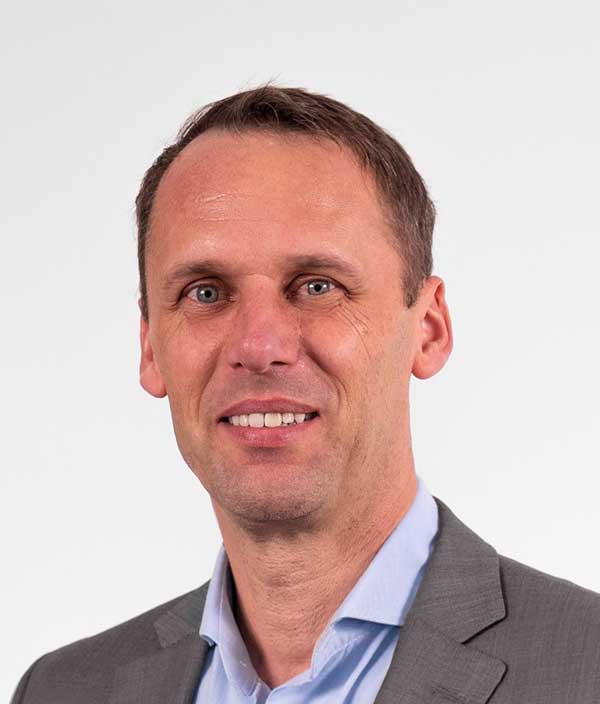
Frank Braunschweig – Senior Product Manager, Water and Wastewater at Bentley Systems
Q: How can technology help cities become more resilient to events such as floods or drought?
Frank Braunschweig: Flooding affects more people worldwide than any other natural hazard, with an estimated global annual average loss of USD 104 billion (according to the United Nations Office for Disaster Risk Reduction). The losses are expected to increase as a result of continued economic growth and climate change.
Innovative software applications can help cities to become more resilient and help city planners to make better-informed decisions. In Lisbon, Portugal, for example, over the past few years, flooding repeatedly occurred in the downtown area. Climate change has caused sea levels to rise and more frequent extreme rainfall events, which have raised the potential for flood events. Rapid urbanization has also impacted the surrounding areas of Lisbon, leading to soil imperviousness that has resulted in even more flood occurrences. Most of the time, flood events are a consequence of heavy rainfall, which occur in single or multiple subcatchments. Lisbon’s existing infrastructure is not adequate to ensure efficient drainage during these storm events. Consequently, inundations in Lisbon, particularly in the downtown area, have become a recurring event in recent years. Between 1900 and 2006, Lisbon registered 84 inundations, and between 2008 and 2014, 15 inundation events occurred. Beyond the material costs, the impact can affect human health and life, which has resulted in a disruptive approach with a new EUR 170 million Drainage Master Plan for the Lisbon Municipality.
Building underground water reservoirs in downtown Lisbon is one possible strategy to contain and prevent flood events in the city. However, it was determined that the impacts of construction in the historic downtown area was not an option. Therefore, the alternative strategy was to deviate the flow of water from the risk areas and tunnel it to the Tagus Estuary. The viability, effectiveness, and advantages, though, of this complex and disruptive engineering solution needed to be fully analyzed and quantified prior to implementation. To avoid the reactive management approaches from the past (build first and check the consequences later), this time a proactive approach was presented. The strategy in the Lisbon municipality was to take advantage of all the available information, knowledge, and technology to develop a comprehensive plan and to study different scenarios before implementation. As a result, Bentley’s state-of-the-art urban flood simulator became a key element on the development of this proactive approach, allowing the city to comprehensively model alternative scenarios.
Water infrastructure is key to the development of smart cities
Q: Do you think investment in water infrastructure is the key to the development of smart cities? And why?
Frank Braunschweig: The natural and artificial water cycle makes up part of any city, and the challenges to manage water properly in cities is a key problem to develop smart cities. If we look at Oporto and Lisbon described earlier, it becomes clear that the water infrastructure is key to the development of smart cities. It is not possible to think about a smart city if we haven’t determined how to supply safe and affordable water to the public, how to collect the sewerage and waste, and how to drain rainfall. Further, cities must also determine how to ensure that water standards are kept at the highest standards in natural environments, including recreation areas. So, the water infrastructure is present everywhere in cities for this reason and is a key element to the development of smart cities.
Q: How can cities prioritize water as a crucial investment for smart city development?
Frank Braunschweig: Clean and affordable drinking water and the proper collection and treatment of sewerage is critical for public health and expected by the public in cities around the world. At the same time, ageing infrastructure puts new challenges to manage and prioritize investments in the water infrastructure. Building digital twins of a city’s water infrastructure will help to make better-informed decisions.

